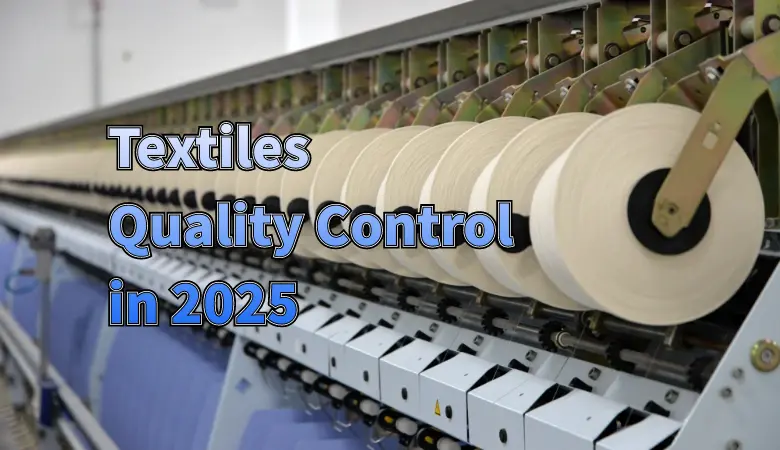By 2025, the textile industry will witness a transformative shift in quality control practices, driven by technological advancements and evolving consumer demands.
From digitalization and automation to the integration of artificial intelligence (AI) and the Internet of Things (IoT), the textile industry is poised to undergo significant changes. These technologies will not only enhance efficiency but also improve the accuracy and reliability of quality control processes.

This guide is designed to serve as a comprehensive resource for textile manufacturers, quality control professionals, and industry stakeholders. It will cover the latest trends, technologies, and best practices in textile quality control, providing insights into how to adapt and evolve in this rapidly changing landscape.
By 2025, textile quality control will be highly automated, emphasizing real-time monitoring and data analysis. Digital tools and technologies will play a pivotal role in ensuring product quality and consistency. Digitalization and automation will simplify the quality control process, reduce human errors, and enhance efficiency. Real-time data analysis will enable faster decision-making and proactive quality management. As consumer awareness of sustainability and ethical manufacturing practices increases, new standards and regulations will emerge, requiring textile manufacturers to adopt stricter quality control measures.
New technologies such as hyperspectral imaging and near-infrared spectroscopy will revolutionize raw material testing, providing detailed information on material composition and quality. Artificial intelligence and machine learning algorithms will enable more accurate and efficient quality assessment of raw materials, reducing the need for manual inspection and improving consistency. Real-time monitoring systems will track raw materials from source to production, ensuring traceability and transparency in the supply chain. As sustainability becomes a key factor in consumer decision-making, textile manufacturers will prioritize environmentally friendly raw materials and adopt sustainable procurement practices.
The integration of the Internet of Things (IoT) and Industrial Internet of Things (IIoT) will enable intelligent production processes, optimizing production efficiency and quality through real-time data collection and analysis. Automation and robotics will play a pivotal role in process control, ensuring precision and consistency in textile production. Predictive maintenance and fault detection systems will minimize downtime, reduce the risk of quality issues, and enhance overall production efficiency. Data analysis will provide valuable insights into the production process, enabling manufacturers to identify inefficiencies and implement improvements for better quality control.
Sensors and smart devices will monitor the production process in real-time, promptly detecting quality issues and taking immediate corrective measures. The real-time quality monitoring and feedback system will ensure timely handling of quality issues, reduce waste, and enhance product consistency. AR and VR technologies will enhance quality control by providing an immersive training environment and enabling virtual inspection of the production process. The cloud-based quality management platform will facilitate collaboration and data sharing, enabling more efficient and effective quality control practices.
New testing methods, such as advanced spectroscopy and chromatography, will provide more accurate and detailed information on the physical and chemical properties of textiles. Non-destructive testing techniques will enable quality assessment without damaging the products, reducing waste and enhancing efficiency. Automated inspection systems will ensure consistent and reliable final quality assurance, minimizing the risk of defective products entering the market.
By 2025, the quality management system will be highly digitized, emphasizing data-driven decision-making and continuous improvement. Digital tools and technologies such as artificial intelligence, machine learning, and the Internet of Things will be integrated into the quality management system, enhancing its effectiveness and efficiency. The International Organization for Standardization and other international standards will be updated to reflect the latest advancements in textile quality control, ensuring that manufacturers adhere to the highest quality standards. Continuous improvement and customer-centric quality management will be key driving forces in the evolution of the quality management system, enabling manufacturers to meet and exceed customer expectations.
Issues such as sustainability concerns and stricter testing requirements necessitate that manufacturers adjust their quality control practices. Implementing proactive strategies, including advanced testing methods and adopting sustainable procurement practices, are crucial for preventing and mitigating quality risks. Big data and analytics will enable manufacturers to identify potential quality issues before they arise, enabling proactive quality management. Collaboration and knowledge sharing are essential in addressing emerging quality challenges, allowing manufacturers to learn from each other and adopt best practices.
Future professionals in textile quality control require a solid foundation in digital tools and technologies, as well as a deep understanding of sustainability and ethical manufacturing practices. Training programs and certifications are crucial in equipping quality control professionals with the skills and knowledge necessary to succeed in the rapidly changing textile industry. Continuous learning and development are essential for quality control professionals to adapt to industry changes and stay ahead of emerging trends and technologies. The field of textile quality control offers a range of career opportunities and paths, from entry-level positions to senior management roles, providing professionals with diverse and rewarding career choices.
By 2025, textile quality control will be highly automated, digitized, and data-driven, emphasizing sustainability and ethical manufacturing practices. New technologies and trends will shape the industry, providing manufacturers with opportunities to enhance efficiency, improve product quality, and meet evolving consumer demands.
Adaptability and innovation will be the key driving forces for textile quality control professionals to succeed, enabling them to cope with industry changes and adopt new technologies and practices to achieve continuous improvement.
We encourage everyone and quality control professionals to adopt new technologies and practices, cultivate a culture of continuous improvement, and ensure that we remain competitive in the rapidly changing textile industry.